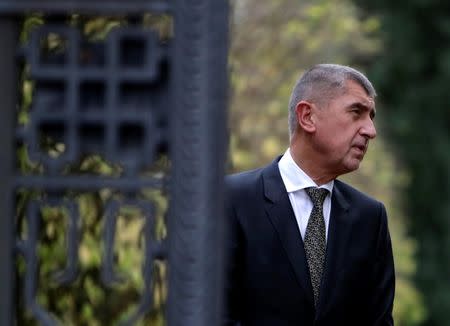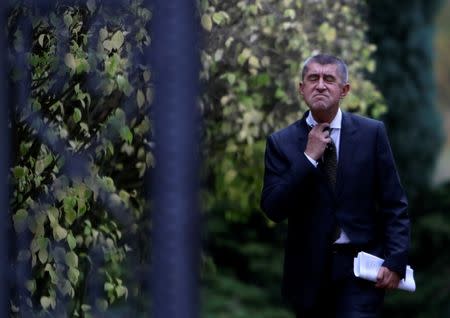Czech election winner Babis calls minority government `unrealistic'
By Robert Muller
LANY, Czech Republic (Reuters) - Czech billionaire Andrej Babis, the runaway winner of last weekend's parliamentary election, said on Monday he wanted to form a governing coalition with a stable partner, and a minority government was an unrealistic plan.
Babis's search for government partners is running into trouble. He faces fraud charges - which he denies - that have led other parties to rule out working with him, even though his ANO party got 29.6 percent of the vote, nearly triple its closest competitor.
The anti-establishment party scored at polls with pledges to clean up corruption and bring a businessman's touch to governance, winning over voters who shunned mainstream parties.
Babis's popularity has grown during his time in the current centre-left government, which has been marked by fast economic growth, a balanced budget, falling unemployment and rising wages.
Babis said after talks with President Milos Zeman at a presidential chateau on Monday that the president would ask him next week to begin leading talks on forming a new cabinet. Traditionally, the president asks the leader of the winning party to lead talks before formally appointing a prime minister.
European Commission President Jean-Claude Juncker sent a congratulatory letter to Babis, saying that the new government should keep in mind the European Union's common values.
"I wish you all the best for the challenge ahead in terms of forming a stable government that will be able to position the Czech Republic as an important participant in the efforts to make the European Union more united, stronger and more democratic on the basis of our common values," he said.
Babis told reporters he preferred having as few parties as possible in the next government.
"A single-colour government is not realistic ... We want to negotiate a coalition government," Babis told reporters. "We of course prefer a stable partner in government for the whole term."
ANO will control 78 seats in the 200-member lower house.
Babis said a link with the election runner-up, the centre-right Civic Democrat party, made sense based on seats in the lower house - together, the two would have a majority. The party, though, has so far refused to cooperate.
In other options, more partners would be needed.
Babis's current partners, the leftist Social Democrats of Prime Minister Bohuslav Sobotka and the centrist Christian Democrats, have rejected a government with ANO unless it pledges Babis will not be part of it.
Babis said he did not want a government that would include Communists and the anti-EU, anti-immigration SPD party, which made surprisingly a strong showing in the election. His position against a minority government also seemed to rule out seeking their support in a less formal arrangement.
Police are looking at whether Babis, the country's second richest person, hid ownership of a convention centre to receive a 2 million-euro EU subsidy in 2008. He has said the investigation was part of efforts to kick him out of politics.
Opponents see Babis, worth an estimated $4 billion, as a danger to democracy, fearing his business and media power could pose conflicts of interest.
(Reporting by Robert Muller, additional reporting by Foo Yun Chee in Brussels, writing by Jason Hovet, Editing by Larry King)

 Yahoo News
Yahoo News 



